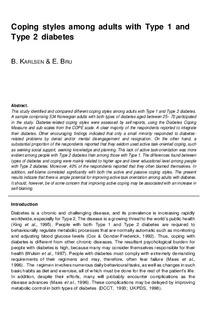| dc.contributor.author | Karlsen, Bjørg | |
| dc.contributor.author | Bru, Edvin | |
| dc.date.accessioned | 2013-07-17T11:37:06Z | |
| dc.date.available | 2013-07-17T11:37:06Z | |
| dc.date.issued | 2002 | |
| dc.identifier.citation | Karlsen, B. & Bru, E. (2002) Coping styles among adults with type 1 and type 2 diabetes. Psychology, health & medicine, 7(3), 245-259. | no_NO |
| dc.identifier.uri | http://hdl.handle.net/11250/184080 | |
| dc.description | This is an electronic version of an article published in Psychology, Health & Medicine © 2002 Copyright Taylor & Francis; Psychology, Health & Medicine is available online at: http://www.tandfonline.com/doi/abs/10.1080/13548500220139403. | no_NO |
| dc.description.abstract | This study identified and compared different coping styles among adults with Type 1 and Type 2 diabetes. A sample comprising 534 Norwegian adults with both types of diabetes aged between 25–70 participated in the study. Diabetes-related coping styles were assessed by self-reports, using the Diabetes Coping Measure and sub-scales from the COPE scale. A clear majority of the respondents reported to integrate their diabetes. Other encouraging findings indicated that only a small minority responded to diabetes-related problems by denial and/or mental disengagement and resignation. On the other hand, a substantial proportion of the respondents reported that they seldom used active task-oriented coping, such as seeking social support, seeking knowledge and planning. This lack of active task-orientation was more evident among people with Type 2 diabetes than among those with Type 1. The differences found between types of diabetes and coping were mainly related to higher age and lower educational level among people with Type 2 diabetes. Moreover, 40% of the respondents reported that they often blamed themselves. In addition, self-blame correlated significantly with both the active and passive coping styles. The present results indicate that there is ample potential for improving active task orientation among adults with diabetes. It should, however, be of some concern that improving active coping may be associated with an increase in self-blaming. | no_NO |
| dc.language.iso | eng | no_NO |
| dc.publisher | Taylor & Francis | no_NO |
| dc.subject | diabetes | no_NO |
| dc.subject | coping | no_NO |
| dc.subject | chronic disease | no_NO |
| dc.subject | chronic illness | no_NO |
| dc.subject | kronisk sykdom | |
| dc.title | Coping styles among adults with type 1 and type 2 diabetes | no_NO |
| dc.type | Journal article | no_NO |
| dc.type | Peer reviewed | no_NO |
| dc.subject.nsi | VDP::Medical disciplines: 700::Health sciences: 800 | no_NO |
| dc.source.pagenumber | 245-259 | no_NO |
| dc.source.volume | 7 | no_NO |
| dc.source.journal | Psychology, health & medicine | no_NO |
| dc.source.issue | 3 | no_NO |
| dc.identifier.doi | 10.1080/13548500220139403 | |
